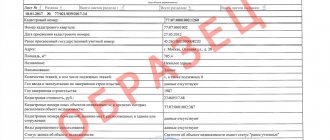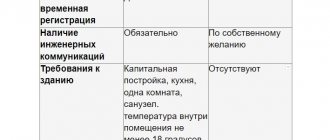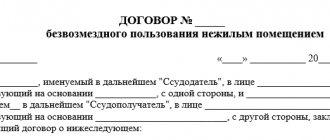Ordinary citizens have many questions regarding recognition of the loss of the right to use residential premises or the preservation of the right to use when the owner changes.
Ambiguous judicial practice misleads both lawyers and ordinary citizens in choosing the method of protecting their rights. It is for this reason that the Supreme Court of the Russian Federation, in its Plenum (No. 14 of July 2, 2009), outlined the main recommendations for these categories of litigation.
The need to recognize the right to use residential premises as lost and, in connection with this, deregister, arises for one of the following reasons:
- the citizen voluntarily left the residential premises due to a change in family circumstances;
- the citizen was forced to leave the residential premises;
- the location of the citizen registered in the residential area is not known;
- the person has ceased to be a family member of the owner of the residential premises.
In this article we will consider the last case when the owner of a residential premises changed. Commentary from a housing lawyer with experience in matters of recognition of the loss of the right to use residential premises.
The Civil Code of the Russian Federation in Article 292 establishes the rights of family members of the owners of residential premises: family members of the owner living in residential premises belonging to him have the right to use this premises under the conditions provided for by housing legislation.
At the same time, part 2 of Art. 292 of the Civil Code of the Russian Federation states that the transfer of ownership of a residential building or apartment to another person is the basis for termination of the right to use residential premises by family members of the previous owner, unless otherwise provided by law.
The above-mentioned Plenum No. 14 of July 2, 2009 clarified these points by indicating that former family members of the owner lose the right to use the residential premises and must vacate it (Part 1 of Article 35 of the Housing Code of the Russian Federation). Otherwise, the owner of the residential premises has the right to demand their eviction in court without providing another residential premises. (Clause 13 of the Plenum).
Preservation of the right of use upon change of owner.
The interpretation in the law: “unless otherwise established by law” makes reference to Art. 31 of the Housing Code of the Russian Federation, which states that in the event of termination of family relations with the owner of a residential premises, the right to use this residential premises for a former family member of the owner of this residential premises is not retained, unless otherwise established by an agreement between the owner and the former member of his family. If a former family member of the owner of a residential premises has no grounds for acquiring or exercising the right to use another residential premises, and also if the property status of a former family member of the owner of a residential premises and other noteworthy circumstances do not allow him to provide himself with another residential premises, the right to use the residential premises owned by to the specified owner, may be retained by a former member of his family for a certain period of time on the basis of a court decision (Part 4 of Article 31 of the Housing Code of the Russian Federation).
This means that a person registered in a residential area can be deregistered and deregistered at the request of the new owner, unless there is a special agreement between the owner and the former family member.
In addition, at the request of a former family member, the court may retain the right to use residential premises for a certain period in the following cases:
a) a former member of the owner’s family does not own any other residential premises, there is no right to use other residential premises under a lease agreement; the former family member is not a party to an agreement on shared participation in the construction of a residential building, apartment or other civil legal agreement for the purchase of housing, etc.; b) if a former member of the owner’s family does not have the opportunity to provide himself with other residential premises (buy an apartment, enter into a rental agreement for residential premises, etc.) due to his property status (no income, insufficient funds) and other noteworthy circumstances (health status, incapacity for work). age or health status, the presence of disabled dependents, loss of work, study, etc.).
The right of a former family member to eliminate violations of his rights to residential premises from the owner is enshrined in Part 3 of Art. 292 of the Civil Code of the Russian Federation. This means that a former family member can bring a claim against the new homeowner.
Documents Statistics on documents and execution of orders
GOVERNMENT OF THE RUSSIAN FEDERATION
RESOLUTION
dated January 21, 2006 No. 25
Moscow
On approval of the Rules for the use of residential premises
(As amended by Decree of the Government of the Russian Federation dated November 7, 2019 No. 1417)
In accordance with Article 17 of the Housing Code of the Russian Federation, the Government of the Russian Federation decides:
1. Approve the attached Rules for the use of residential premises.
2. To recognize as invalid:
Resolution of the Council of Ministers of the RSFSR dated September 25, 1985 No. 415 “On approval of the Rules for the use of residential premises, maintenance of a residential building and local area in the RSFSR and the Standard Agreement for the rental of residential premises in houses of the state, municipal and public housing stock in the RSFSR” (SP RSFSR, 1986, No. 2, Art. 10);
subparagraphs “c” and “d” of paragraph 2 of the Decree of the Government of the Russian Federation of January 18, 1992 No. 34 “On introducing amendments, additions and invalidating certain decisions of the Council of Ministers of the RSFSR on the regulation of housing legal relations” (SP RF, 1992, No. 6, art. 31);
paragraph 3 of Appendix No. 2 to the Resolution of the Council of Ministers - Government of the Russian Federation of July 23, 1993 No. 726 “On invalidating and amending certain decisions of the Government of the Russian Federation in connection with the adoption of the Law of the Russian Federation “On the Fundamentals of Federal Housing Policy” ( Collection of acts of the President and Government of the Russian Federation, 1993, No. 31, Article 2860).
Chairman of the Government of the Russian Federation M. Fradkov
APPROVED by Decree of the Government of the Russian Federation of January 21, 2006 No. 25
RULES for the use of residential premises
(As amended by Decree of the Government of the Russian Federation dated November 7, 2019 No. 1417)
I. General provisions
1. These Rules determine the procedure for using residential premises of state and municipal housing funds, as well as residential premises owned by citizens in apartment buildings (hereinafter referred to as residential premises).
2. Residential premises are recognized as isolated residential premises, which are real estate and are suitable for permanent residence of citizens.
3. Residential premises are intended for the residence of citizens.
4. Residential premises may be used by citizens legally residing there (along with residence) for professional activities or individual entrepreneurial activities, if this does not violate the rights and legitimate interests of other citizens, as well as the requirements that the residential premises must meet.
It is not allowed to locate industrial production facilities or hotels in residential premises, as well as to carry out missionary activities in residential premises, except for the cases provided for in Article 16 of the Federal Law “On Freedom of Conscience and Religious Associations”. Residential premises in an apartment building cannot be used to provide hotel services.
(Clause as amended by Decree of the Government of the Russian Federation dated November 7, 2019 No. 1417)
5. The right to use residential premises has:
the tenant of the residential premises (hereinafter referred to as the tenant) and his family members - under a social tenancy agreement for residential premises;
the tenant and citizens permanently residing with the tenant - under a rental agreement for residential premises of state and municipal housing funds for commercial use;
the tenant and his family members - under a rental agreement for specialized residential premises;
the owner of the residential premises and members of his family;
a member of a housing or housing construction cooperative and members of his family.
6. The use of residential premises is carried out taking into account the rights and legitimate interests of citizens and neighbors living in the residential premises, fire safety requirements, sanitary, hygienic, environmental and other legal requirements, as well as in accordance with these Rules.
II. Use of residential premises under a social tenancy agreement
7. The right to use residential premises under a social tenancy agreement arises on the basis of an agreement concluded (in writing) in accordance with the Model Social Tenancy Agreement for residential premises, approved by the Government of the Russian Federation.
8. In an apartment building, the tenant and his family members have the right to use the common property in this building.
9. As a user of residential premises, the tenant has the right:
a) move other persons into the occupied residential premises. Move-in is carried out with the consent (in writing) of family members of the tenant, including those temporarily absent, and the landlord. The consent of other family members and the landlord is not required to move their minor children into the parents' home;
b) with the consent (in writing) of the landlord and members of his family living together with the tenant, including those temporarily absent, part of the residential premises, and in the case of temporary departure, all residential premises for sublease on the terms established by the Housing Code of the Russian Federation;
c) allow, by mutual agreement with family members living together with the tenant and with prior notification to the landlord, free residence in residential premises for citizens as temporary residents under the conditions established by the Housing Code of the Russian Federation;
d) carry out, with the consent (in writing) of the landlord and members of his family living with the tenant, including those temporarily absent, the exchange of occupied residential premises for residential premises occupied under a social rental agreement for residential premises by another tenant, in the manner and on the terms, established by the Housing Code of the Russian Federation;
e) demand from the landlord timely major repairs of the residential premises, proper participation in the maintenance of common property in the apartment building, as well as the provision of utilities.
The employer has other rights provided for by law.
10. As a user of residential premises, the tenant is obliged to:
a) use the residential premises for their intended purpose and within the limits established by the Housing Code of the Russian Federation;
b) use the residential premises taking into account the rights and legitimate interests of citizens and neighbors living in the residential premises;
c) ensure the safety of the residential premises, prevent the performance of work in the residential premises or the commission of other actions leading to its damage;
d) maintain the proper condition of the residential premises, as well as common areas in an apartment building (apartment), maintain cleanliness and order in the residential premises, entrances, elevator cabins, stairwells, and other common areas, ensure the safety of sanitary and other equipment equipment, as well as comply with the requirements of paragraph 6 of these Rules;
e) immediately take possible measures to eliminate detected defects in the residential premises or sanitary and other equipment located in it, and, if necessary, report them to the landlord or the relevant management organization;
f) carry out routine repairs of residential premises;
g) pay rent for housing and utilities on time. The obligation to pay for residential premises and utilities arises from the moment of concluding a social tenancy agreement for residential premises in accordance with the law;
h) inform the landlord, within the time frame established by the social tenancy agreement, about changes in the grounds and conditions affecting the use of the residential premises;
i) allow, at a pre-agreed time, into the residential premises employees of the landlord or persons authorized by him, representatives of state control and supervision bodies to inspect the technical and sanitary condition of the residential premises, sanitary and other equipment located in it, as well as to carry out the necessary repair work ;
j) not carry out reconstruction and (or) redevelopment of residential premises in violation of the established procedure;
k) upon termination of the right to use residential premises, hand over to the lessor in good condition the residential premises, sanitary and other equipment located in it, pay the cost of repairs of the residential premises, sanitary and technical and other equipment located in it that were not carried out by the tenant, or carry out repairs at your own expense, as well as pay off debts for payment of housing and utilities.
The employer bears other obligations provided for by law.
11. Family members of the tenant have equal rights to use the residential premises.
III. Use of residential premises under a rental agreement for specialized residential premises
12. Specialized residential premises are intended:
for residence of citizens during work, service, training;
for temporary residence of citizens in connection with major repairs or reconstruction of a house;
for temporary residence of citizens in connection with the loss of residential premises as a result of foreclosure on it;
for temporary residence of citizens due to the unsuitability of residential premises for living as a result of emergency circumstances;
for the residence of citizens who, in accordance with the law, are classified as citizens in need of social protection with the provision of medical and social services;
for residence of citizens recognized as forced migrants and refugees;
for temporary residence of citizens in need of special social protection;
for residence of citizens in connection with election to elective positions or appointment to public office.
13. As a user of specialized residential premises, the tenant also uses the common property in an apartment building.
14. As a user of specialized residential premises, the tenant is obliged to:
a) use the residential premises for their intended purpose and within the limits established by the Housing Code of the Russian Federation;
b) use the residential premises taking into account the rights and legitimate interests of citizens and neighbors living in the residential premises;
c) ensure the safety of the residential premises, prevent the performance of work in the residential premises or the commission of other actions leading to its damage;
d) maintain the proper condition of the residential premises, as well as common areas in an apartment building (apartment), maintain cleanliness and order in the residential premises, in entrances, elevator cabins, stairwells, and other common areas, ensure the safety of sanitary and technical equipment other equipment, as well as comply with the requirements of paragraph 6 of these Rules;
e) immediately take possible measures to eliminate detected defects in the residential premises or sanitary and other equipment located in it, and, if necessary, report them to the landlord or the relevant management organization;
f) carry out routine repairs of residential premises;
g) pay rent for housing and utilities on time. The obligation to pay for residential premises and utilities arises from the moment of concluding a rental agreement for specialized residential premises in accordance with the law;
h) allow, at a pre-agreed time, into the residential premises the employees of the landlord or persons authorized by him, representatives of state control and supervision bodies to inspect the technical and sanitary condition of the residential premises, sanitary and other equipment located in it, as well as to carry out the necessary repair work ;
i) not carry out reconstruction and (or) redevelopment of residential premises in violation of the established procedure;
j) upon termination of the right to use residential premises, hand over to the landlord in good condition the residential premises, sanitary and technical and other equipment located in it, according to the act, pay the cost of repairs of the residential premises, sanitary and technical and other equipment located in it that were not carried out by the tenant, or carry out repairs at your own expense, as well as pay off debts for payment of housing and utilities.
The employer bears other obligations provided for by law.
15. When using specialized residential premises, the tenant does not have the right to exchange the occupied residential premises, or sublease it.
16. Members of the tenant’s family have equal rights and responsibilities for the use of specialized residential premises.
IV. Use of residential premises in an apartment building by the owner of the residential premises and members of his family living with him
17. The owner of residential premises in an apartment building (hereinafter referred to as the owner) uses the residential premises for their intended purpose and within the limits established by the Housing Code of the Russian Federation.
18. As a user of residential premises, the owner also uses the common property in an apartment building.
19. As a user of residential premises, the owner is obliged:
a) use the residential premises for their intended purpose and within the limits established by the Housing Code of the Russian Federation;
b) ensure the safety of living quarters;
c) maintain the proper condition of the living space;
d) bear the costs of maintaining the residential premises belonging to him, as well as participate in the costs of maintaining the common property in an apartment building in proportion to his share in the right of common ownership of the property by paying a fee for the maintenance and repair of the residential premises;
e) make timely payments for the maintenance and repair of residential premises, including fees for services and work on managing an apartment building, maintenance, current and major repairs of common property in an apartment building, and fees for utilities.
The owner bears other obligations provided for by law.
20. Members of the owner’s family have equal rights to use residential premises, unless otherwise established by agreement between the owner and members of his family.
21. Capable members of the owner’s family bear joint and several liability with the owner for obligations arising from the use of residential premises, unless otherwise established by agreement between the owner and members of his family.
V. Use of residential premises under a rental agreement for residential premises of state and municipal housing funds for commercial use
22. As a user of residential premises, the tenant has the right:
a) to move, by mutual agreement with the landlord and citizens permanently residing with the tenant, into the residential premises of other citizens as permanent residents of the tenant. When moving in minor children, such consent is not required;
b) allow, by mutual agreement with citizens permanently residing with the tenant, and with prior notification to the landlord, temporary residents to stay in the residential premises free of charge;
c) sublease part or all of the residential premises with the consent of the landlord.
23. In an apartment building, the tenant and citizens permanently residing with the tenant under a lease agreement for residential premises of state and municipal housing funds for commercial use also use the common property of the apartment building.
24. As a user of residential premises, the tenant is obliged:
a) use the residential premises only for living;
b) ensure the safety of living quarters;
c) maintain the living space in proper condition;
d) do not carry out reconstruction and reconstruction of residential premises without the consent of the landlord;
e) pay rent for housing and utilities on time;
f) carry out routine repairs of residential premises, unless otherwise established by the lease agreement for residential premises of state and municipal housing funds for commercial use.
The employer bears other obligations provided for by law.
25. Citizens who permanently live with the tenant have equal rights to use residential premises.
VI. Responsibility for non-compliance with the Rules for the use of residential premises
26. Violation of these Rules entails liability in accordance with the law.
____________
Who does the law classify as former family members?
Within the meaning of parts 1 and 4 of Article 31 of the Housing Code of the Russian Federation, former family members of the owner of a residential premises include persons with whom the owner’s family relations have been terminated. The termination of family relations between spouses should be understood as the dissolution of a marriage in the civil registry office, in court, or the recognition of a marriage as invalid. Refusal of other persons to maintain a common household with the owner of the residential premises, lack of a common budget or common household items with the owner, failure to provide mutual support to each other, etc., as well as departure to another place of residence may indicate the termination of family relations with the owner living space.
The issue of recognizing a person as a former family member of the owner of a residential premises in the event of a dispute is decided by the court, taking into account the specific circumstances of each case.
Differences between ownership and use
The owner is the full owner of the residential property. There are two types of housing on the territory of the Russian Federation:
- private;
- municipal.
Owners of private real estate include citizens and organizations, and owners of municipal housing include the state in the form of a municipality.
The right to own housing may be registered or unregistered . When registering, the owner receives a special certificate, which is the main document of title.
If the registration was carried out in ancient “pre-perestroika” times, then the owner must have certificates of the old form (for private houses and land plots) or orders (for apartments), which are also valid.
But homeowners do not always register their ownership rights. However, they are not deprived of this right. For example, by paying a share to a cooperative, the shareholder becomes the full owner of the home.
The main difference between the right of use and the right of ownership is the powers given to it. Persons entitled to use can only reside in this dwelling .
The rights of owners also include the ability to carry out transactions with the property (sale, exchange, rental, donation, etc.), as well as registering relatives in this territory.
Agreement for free use of residential premises
This is a special type of agreement; it does not oblige the user to pay anything for living in the apartment. This relationship between the user and
by the owner of the property are described in Chapter 36 of the Civil Code. In this case, the terms of the agreement are mentioned:
- the lender is the owner of the apartment;
- the borrower is the user.
The contract must indicate:
- full passport data of both parties to the contract;
- rights and obligations of the parties;
- term of the contract.
a sample agreement for the free use of residential premises here .
You can lose use of such an agreement early in the following cases (Article 698 of the Civil Code):
- if the apartment is not used for living;
- if the tenant spoils the furnishings or communications and does not monitor the maintenance;
- if he does not pay utilities (this condition must be clearly stated in the contract).
There may be other grounds for eviction, such as renting to outsiders.
If the apartment is municipal
Haven't you privatized your apartment yet? So you are a user, but not
owner. During privatization, the apartment will be registered as the property of everyone registered in it, and while it is not yours, you are obliged to pay bills and maintain housing.
You can lose use of a municipal apartment in the following cases:
- leaving for another permanent place of residence;
- systematic violation of the rules of living in an apartment (non-payment of utilities for more than six months, destruction and damage to the apartment, communications, illegal redevelopment, violation of the rights of neighbors, use of the apartment for purposes other than residence);
- deprivation of parental rights (if the court finds that the parents do not have the right to live with the child).
Important. If one of the residents goes to live permanently in another place, the others do not lose the right to use the apartment.
Office, rental, rental and student accommodation
There is a contract for the use of residential premises. The terms of the contract are always fixed in writing, and the contract itself must be in the hands of both the owner of the premises and the user. In this case, the annuity agreement is registered in Rosreestr. The lease agreement must also be registered if its term is longer than a year.
The following have the right to use housing:
- workers or employees (for the duration of service or work);
- pupils and students (for the duration of study);
- tenants (for the duration of the lease agreement);
- rent recipients (either for the duration of the contract or for life).
If the terms of the contract are not met, you can legally lose the right to use such housing.
Testamentary refusal
It is easier to explain this concept using an example: a grandfather lived in an apartment with his partner. After his death, the apartment passed to his grandson in his will. However, it turned out that the grandfather’s will directly stated that the cohabitant has the right to use the apartment either for life or for a specified period of time. This is a testamentary refusal.
This right is enshrined in Article 33 of the Housing Code. In this case, the right to use in this mode can be registered in Rosreestr.
For reference. If the apartment is sold by the grandson, the cohabitant will still have the right to live in it.






